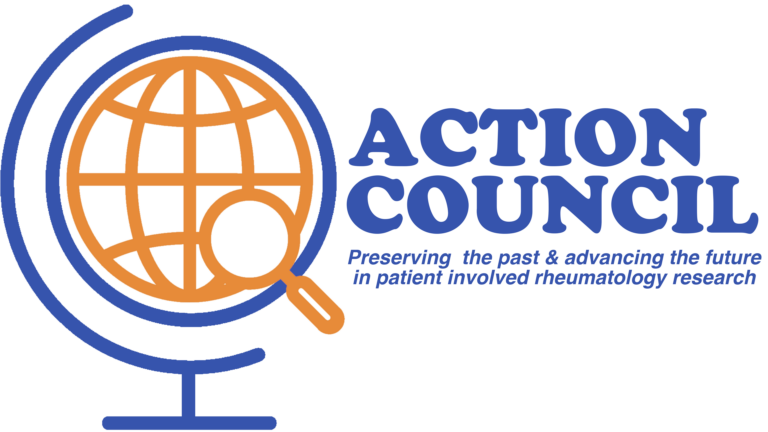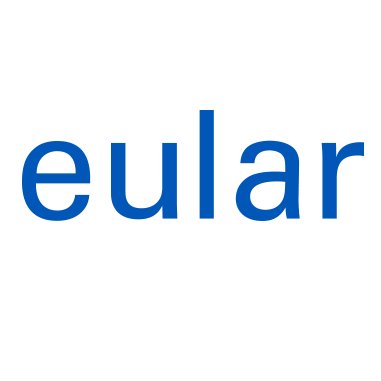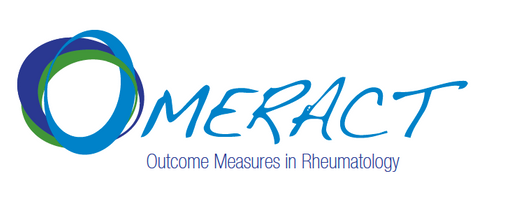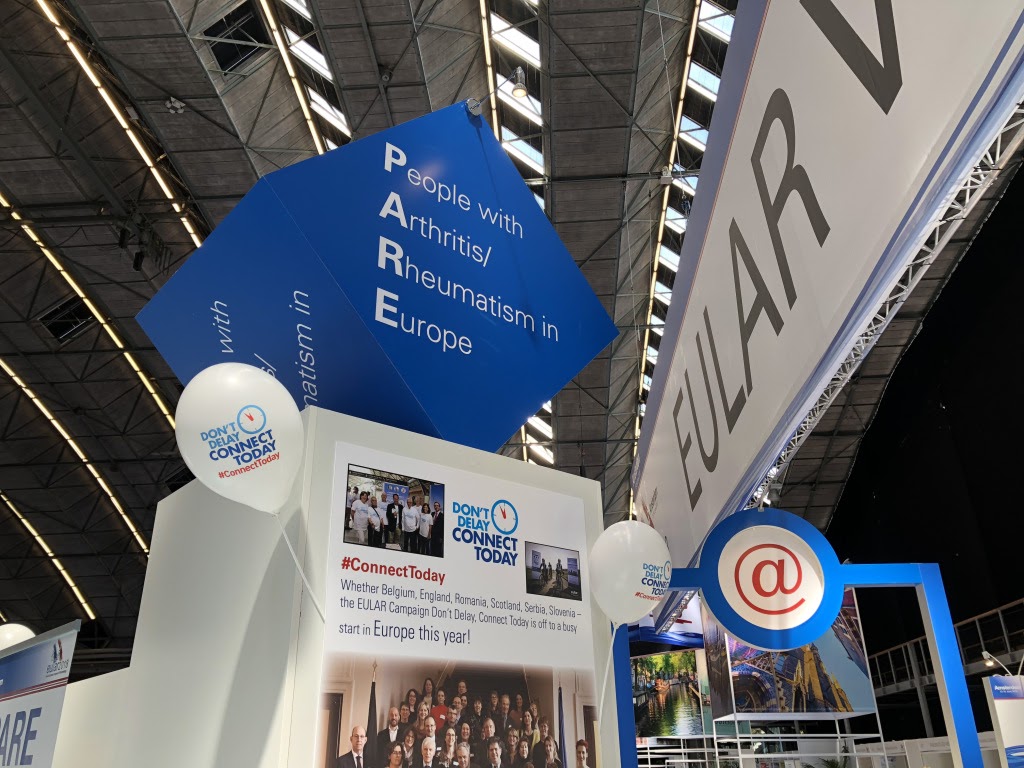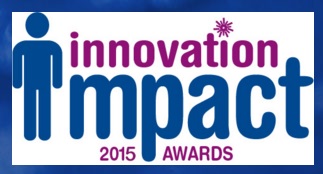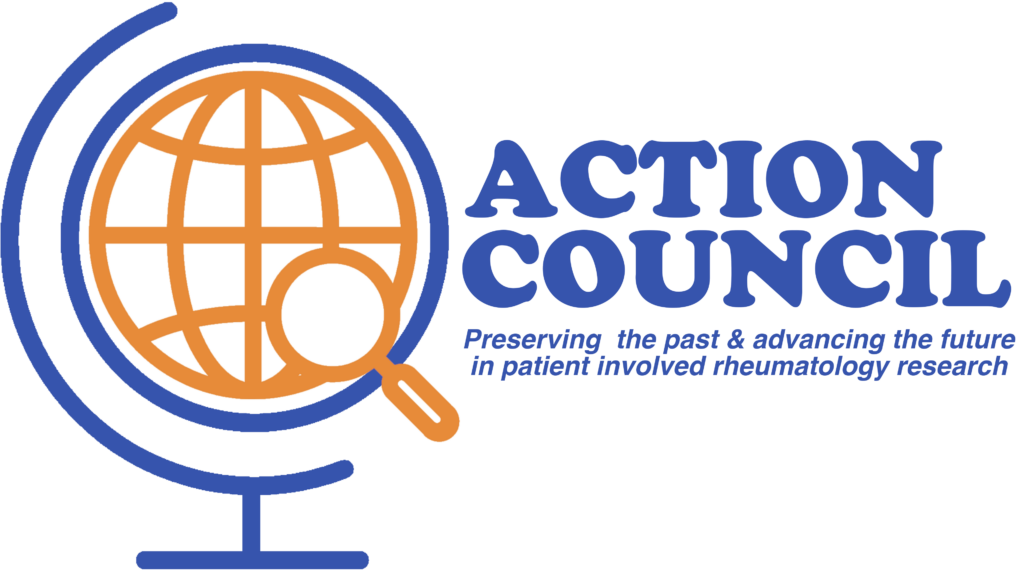Novel Firsts Pathway
Novel Firsts

EULAR Congress Inclusion of Patients
- 1973: In 1973, “Social Leagues” – which were the patient organizations – officially joined the European Alliance of Associations for Rheumatology (EULAR)EULAR is the organization that represents people with arthritis/rheumatism, health professionals (HPR), and scientific societies of rheumatology of all the European nations. The aims of EULAR are to reduce the burden of rheumatic diseases on the individual and society and to improve the treatment, prevention, and rehabilitation of musculoskeletal diseases. To this end, EULAR fosters excellence in education and research in the field of rheumatology. It promotes the translation of research advances into daily care and fights for the recognition of the needs of people with musculoskeletal diseases by the governing bodies in Europe. As such, they have always had their own educational program at the annual EULAR Congress meeting, but in the earlier years, the symposia they organized was mostly independent of the other congress sessions. eular.org which is now the European League Against Rheumatism.
- 1991: The EULAR Congress in Budapest marks a change in the goal to implement more comprehensive programs organized by the Social Leagues, including more collaboration with health professionals.
It was not until 2008, after the EULAR Congress in Paris, where patient organizations merged into EULAR, becoming EULAR PARE (People with Arthritis/Rheumatism in Europe)EULAR PARE is the Committee within EULAR comprised of representatives and musculoskeletal user groups around Europe to work together towards improving the quality of life for people in Europe living with these conditions, with the vision to empower and help them lead full and independent lives.
www.eular.org/pare.cfm
For decades, EULAR PARE has featured patient posters dedicated to education and advocacy, and later an increasing number of abstracts and program sessions on collaborative research.
CoPI: Conference participant
Context: Poster presentation
Patient research collaboration in rheumatology begins in Canada
- 1998: First self-governed Consumer Advisory Council (CAC)The mission of the Consumer Advisory Council (CAC) is to advocate for consumers and provide for strong public and consumer input in healthcare reform policies in Connecticut. The purpose of the Consumer Advisory Council is to ensure significant consumer participation in the planning and implementation process. portal.ct.gov/OHS/Pages/Consumer-Advisory-Council was established as part of Canadian Arthritis Network/CAN The Canadian Arthritis Network (CAN) is a not-for-profit organization that supports integrated, trans-disciplinary research and development. can.arthritisalliance.ca, the first federally funded arthritis research institute in Canada. After morphing into the Alliance for the Canadian Arthritis Program (ACAP) in 2012, then Alliance for Arthritis in in Canada (ACC), the group was disbanded in 2019.
- 2000: Arthritis Research Canada (ARC) ARC was created in 2000 in recognition of the tremendous potential that research can bring to arthritis treatment in Canada, and indeed, the world. Arthritis Research Canada has earned international attention as a leading arthritis research environment. We have built a strong multi-disciplinary research team of outstanding medical doctors and research scientists, and we willingly collaborate with medical professionals around the world. www.arthritisresearch.ca and established the Arthritis Patient Advisory Board (APAB).The Arthritis Patient Advisory Board (APAB) is comprised of volunteer advocates with arthritis who bring personal experience and arthritis knowledge to research decision making at Arthritis Research Canada. Their goal is to ensure the patient perspective is represented on research matters related to prevention, treatment and self-management of arthritis. Individually and collectively, they communicate research information and findings to arthritis patients, professional organizations and the general public. www.arthritisresearch.ca
- Additionally, Patient Organization, Arthritis Consumer Experts/JointHealthⓇArthritis Consumer Experts/JointHealthⓇ, a national organization that provides free, science-based information and education programs in both official languages to people with arthritis. https://jointhealth.org/ , was established.
CoPI: Advisory panels
Context: Research & Development
Patients are invited to join the rheumatology research team
- 2002: Outcome Measures in Rheumatology (OMERACT) OMERACT is a global community for the development of Core Outcome Sets in the field of rheumatology. Patients participate as research partners in all phases of the research and are equal members in any OMERACT working group.
www.omeract.org invites patients to participate for the first time, alongside researchers and rheumatologists.
This led to the development of the CoPI Patient Research Partner (PRP) Patient Research Partner (PRP) is defined as a person with a relevant disease who participates or has participated as an active research team member on an equal basis with professional researchers, thus adding the value of experiential knowledge to a research project. established by the European League Against Rheumatism (EULAR)EULAR is the organization that represents people with arthritis/rheumatism, health professionals (HPR), and scientific societies of rheumatology of all the European nations. The aims of EULAR are to reduce the burden of rheumatic diseases on the individual and society and to improve the treatment, prevention, and rehabilitation of musculoskeletal diseases. To this end, EULAR fosters excellence in education and research in the field of rheumatology. It promotes the translation of research advances into daily care and fights for the recognition of the needs of people with musculoskeletal diseases by the governing bodies in Europe. As such, they have always had their own educational program at the annual EULAR Congress meeting, but in the earlier years, the symposia they organized was mostly independent of the other congress sessions. eular.org in 2010. See Experience Working with Patients in Research Leads to Guidance for Best Practices, 2010. Read more about the initial history of patient involvement at OMERACT ![]() .
.
CoPI: Patient Research Partner (PRP), conference participant
Tools: Report – Patient Researcher Engagement
Databanks and Registries
Databanks and registries in the rheumatology community began actively collecting relevant data from patients that can be used in both non-pharmaceutical and drug development research efforts. However, most registries – while rheumatology in nature – typically only include patients as respondents.
CoPI: Co-production of stakeholder groups
Context: Registries
Young people and families are included in research
- 2002: The Childhood Arthritis and Rheumatology Research Alliance (CARRA) Founded by a small group of pediatric rheumatologists who aimed to create an investigator-led collaborative research network by establishing a registry. The information is provided by the medical team and by patients and their families. The registry was created to monitor the long-term safety of the medications used to treat pediatric rheumatic diseases. https://carragroup.org pediatric registry is established. The founding members quickly realized that one of the best ways to achieve its primary focus was to begin a registry project. The CARRA Registry was later founded as a means to collect information about how childhood-onset rheumatic diseases are treated and how they affect patients by collecting information from the medical team, patients, and their families. United States
- 2006: The National Institute for Health Research (NIHR) (NIHR) was established in 2006 under the government’s health research strategy Best Research for Best Health to “create a health research system in which the NHS supports outstanding individuals, working in world-class facilities, conducting leading-edge research focused on the needs of patients and the public”. Since that time, we have transformed research in and for the NHS and helped to shape the health research landscape more broadly. Our mission is unchanged: to improve the health and wealth of the nation through research. We deliver against this mission through five core workstreams. www.nihr.ac.uk establishes the ‘Patient Research Ambassadors’ network and supporting GenerationRGenerationR is a National Network (GenerationR Alliance) of Young People’s Advisory Group’s (YPAGs) based across the United Kingdom to support the design and delivery of paediatric research. GenerationR Alliance YPAGs are a resource available to any health researcher (both academic and life science industries) who seek the input of children, young people, and families in their research projects www.invo.org.uk , a series of young people’s advisory groups across the country enabling children and young people under 25 to be involved in research. United Kingdom
CoPI: Advisory panels
Context: Research & Development, dissemination (knowledge translation), children, registries, young adults
EULAR PARE Established
www.eular.org/pare.cfm. In this year it was also decided that PARE members should be user-led organizations. This was put in writing through a the publication of PARE Value Principles. At this time, health professionals also became their own Standing Committee. This was the beginning of the three pillars of EULAR, which still exist today.
Since this time, EULAR PARE has featured patient posters dedicated to education and advocacy, and later an increasing number of abstracts and program sessions on collaborative research.
CoPI: Conference participant
Context: Poster presentation
Focus on expanding PCOR leads to the established of collaborative communities – United States
- 2013: PCORnet PCORnet is a national resource that offers the kind of research ecosystem that has long been pursued: a fully integrated network where vast, highly representative health data, research expertise, and patient insights are built-in and accessible from the very start. The infrastructure of PCORnet is well established, meaning that the community knows how to maximize the value of these connections to deliver fast, trustworthy answers that advance public health. pcornet.org – The era of big data, loosely defined as the development and analysis of large or complex data sets, the Patient-Centered Outcomes Research Institute (PCORI) The Patient-Centered Outcomes Research Institute (PCORI) is an independent nonprofit, nongovernmental organization and was authorized by Congress in 2010. PCORI is the largest funder of comparative effectiveness research (CER) in the United States with the mandate to improve the quality and relevance of evidence available to help patients, caregivers, clinicians, employers, insurers, and policymakers make better-informed health decisions.
www.pcori.org establishes PCORnet, bringing new opportunities to empower patients and their families to generate, collect, and use their health information for both clinical and research purposes. Through PCORnet, a “network of networks” was established– Patient-Powered Research Networks (PPRNs), built and governed by stakeholder groups focused on specific conditions and community interests. Learn more about PPRN’s .
.
Two rheumatology specific PPRN’s were developed, including:
- 2015: ArthritisPowerVisit the ArthritisPower.org website for products and/or info about how to get involved. led by CreakyJointsCreakyJoints is a digital community for millions of arthritis patients and caregivers worldwide who seek education, support, advocacy, and patient-centered research. CreakyJoints is a part of the non-profit Global Healthy Living Foundation, which receives funding from grants and sponsorships from pharmaceutical manufacturers, private foundations, and government-sponsored research grants. They frequently collaborate on research with major research institutions and universities.
creakyjoints.org. ArthritisPower is a non-profit, patient-inspired, and patient-managed research initiative that helps patients make a difference in the fight against arthritis and related conditions. View ArthritisPower overview, includes links to publications .
. - 2015: Patients, Advocates and Rheumatology Teams Network for Research and Service (PARTNERS) PARTNERS is a PPRN linking patients, family members, caregivers, researchers, healthcare providers, and other people interested in pediatric rheumatic diseases. Through PARTNERS, patients, family members, and other caregivers are able to share research ideas, work on proposals, and join study teams. www.arthritis.org/science ) – led by healthcare providers, Childhood Arthritis and Rheumatology Research Alliance (CARRA)Childhood Arthritis and Rheumatology Research Alliance (CARRA) was founded by a small group of pediatric rheumatologists who aimed to create an investigator-led collaborative research network by establishing a registry. The information is provided by the medical team and by patients and their families. The registry was created to monitor the long-term safety of the medications used to treat pediatric rheumatic diseases.
carragroup.org/, the US Arthritis FoundationThe Arthritis Foundation boldly pursues a cure for America’s #1 cause of disability while championing the fight against arthritis with life-changing resources, science, advocacy, and community connections. https://www.arthritis.org/, Friends of CARRA, the Lupus Foundation of AmericaLupus Foundation of America’s mission is to improve the quality of life for all people affected by lupus through programs of research, education, support, and advocacy.
www.lupus.org/, and a quality-improvement learning network (Pediatric Rheumatology Care and Outcomes Improvement Network, or PR-COIN)Pediatric Rheumatology Care and Outcomes Improvement Network (PR-COIN) works to improve outcomes and provide safe, effective, efficient, timely, patient-centered, and equitable care for all children with rheumatic conditions. Our goals are to increase remission and clinically inactive disease rates among children with JIA, improve quality of life including optimal physical function and pain, and support families in managing their child’s condition.
https://pr-coin.org/. View summary overview of PARTNERS .
. - 2015 PCORnet Assessment: Report evaluating the strengths and weaknesses of the initial phase dedicated to building its governance, technical, and research infrastructure. View report
 .
.
CoPI: Patient-Centered Outcomes Research (PCOR), co-production of stakeholder groups, patient-powered networks
Tools: Reports – patient research engagement
Context: Registries, patient-powered registries, children
Young People Help Shape Rheumatology Research
Young people need a voice too! The evolution of patient engagement in rheumatology research expands to ensure the voice of the younger patients is counted.
- 2014: EULAR Young PAREYoung PARE aims to improve the quality of life of young people (18 to 35 years old) with rheumatic and musculoskeletal diseases (RMDs) by raising the profile of these conditions, and by creating a network of individuals who work in European countries on behalf of young people with RMDs.
eular.org/pare_young_pare was established as the first youth committee (ages 18-35) established within an international umbrella organization, with a remit for embedding the youth perspective into EULAR’s activities, as well as in shaping clinical and research activities of relevance to young people. The founding of Young PARE was based on a collaborative and co-produced youth research project, funded by EULAR, in collaboration with young people, adult patients, health professionals and researchers in rheumatology across Europe. - 2016: Your RheumYour Rheum is a group of people in the UK aged 11-24 years who have a diagnosed rheumatic condition. Your Rheum provides an easy way for young people to understand and get involved in rheumatology research that is relevant to them.
https://yourrheum.org/ was established to provide young people aged 11 to 24 with the opportunity to shape pediatric and adolescent rheumatology research. United Kingdom
CoPI: Advisory panels, co-production of stakeholder groups
Context: Children, Research & Development, young adults
Pharmaceutical companies get more involved in patient research collaborations
By 2015, most pharmaceutical companies had formed “patient engagement” departments and regularly enlisted the help of Patient Advocates to serve on Advisory Panels, summarizing the patient experience on behalf of the entire population. In addition to recognizing a need to include a more realistic patient sample, efforts to include patient collaboration in early drug development were also underway.
- 2015: The International Foundation for Autoimmune & Autoinflammatory Arthritis (AiArthritis)AiArthritis helps others, like us, living with autoimmune or autoinflammatory diseases that include inflammatory arthritis as a major clinical component, have a voice – alongside other stakeholders as equals – so, together, we can solve problems that impact education, advocacy, and research. www.aiarthritis.org wins an Innovation Impact award winner for their A Community Team (ACT) project
 .
.
- Addressed regulatory barriers between patients and industry
- Tested a new Concept of Patient Involvement (CoPI) where patients lead qualitative research with professionals as their advisors (Mentor Assisted ResearchMentor Assisted Research is a CoPI where patients lead various phases of research with professionals assisting as advisors.) FORWARD National Databank for Rheumatic Diseases served as a research consultant.
- Improved sample accuracy by enabling all patients to be included, regardless of prior advocacy experience, geography, or disease limitations.
- 2015: Pharmaceutical companies sit “at the table”, along with patient groups and other stakeholders, to help the Clinical Trials Transformative Initiative (CTTI)This group was organized to develop and drive adoption of practices that will increase the quality and efficiency of clinical trials.
www.ctti-clinicaltrials.org develop recommendations regarding ways patients groups (i.e., patient and disease advocacy organizations, voluntary health organizations, nonprofit research foundations, public health organizations) could be engaged in the therapy development process, particularly around clinical trials. AiArthritis referenced these recommendations, and associated CTTI tool
regarding ways patients groups (i.e., patient and disease advocacy organizations, voluntary health organizations, nonprofit research foundations, public health organizations) could be engaged in the therapy development process, particularly around clinical trials. AiArthritis referenced these recommendations, and associated CTTI tool  , as a starting point to build on additional ways to increase engagement.
, as a starting point to build on additional ways to increase engagement.
Clinical Trials: For the first time in the mid 2010’s, industry begins enlisting the help of patients, via Advisory Panels, to help develop new strategies for all phases of the Research & Development continuum, with a focus on clinical trials.
CoPI: Mentor Assisted Research (MAR), co-production of stakeholder groups, advisory panel
Tools: Reports – patient engagement
Context: Qualitative research, Research & Development, clinical trials
the ACTion Council is established
Led by patients who have helped shaped patient engagement in this space, the ACTion CouncilLearn more about the ACTion Council at www.rheumactioncouncil.org unites a global representation of key stakeholders in the rheumatology research community to record the history of patient engagement and track its continued expansion so efforts are not duplicated, value measurements can be improved, and new initiatives can evolve from existing successes.
Precision Medicine in Rheumatology is on the Horizon
- 2017: While Precision Medicine (PM) Precision Medicine is a medical approach that proposes to prevent and treat disease based upon a person’s unique genetic makeup and their lifestyle habits. Precision medicine, the ability to accurately measure specific predictors of patient outcomes is implemented in personalized clinical care. research has progressed in oncology for years, only recently has there been a focus in the rheumatology spaces. As treat-to-target (T2T)T2T is a medical strategy that sets remission – defined as the absence of signs and symptoms of significant inflammatory disease activity – or low disease activity as a goal. Specific disease management targets are set. Then disease activity may be measured as frequently as monthly through lab tests and clinical examinations. If the targets are not reached, medications and/or doses are adjusted according to a predefined protocol. The process continues until the goal is achieved. www.aiarthritis.org/precisionmedicine treatment protocols prove successful, and the complexity of rheumatic diseases is realized, efforts to advance science towards precision treatments have continued to evolve.
- 2019: Preparing Patients for Precision Medicine Project – (Underway) – Developing a patient-led shared decision-making tool to help patients talk to their doctors about participating in future precision medicine trials, which will include patients who will may differ from those currently enrolled (general patient population versus atypical presentation). Learn more. – International Foundation for Autoimmune & Autoinflammatory Arthritis (AiArthritis) AiArthritis helps others, like us, living with autoimmune or autoinflammatory diseases that include inflammatory arthritis as a major clinical component, have a voice – alongside other stakeholders as equals – so, together, we can solve problems that impact education, advocacy, and research.www.aiarthritis.org
, professional advisor OMERACT.
CoPI: Research advocacy, Mentor Assisted Research (MAR)
Context: Precision medicine, clinical trials, decision aids
Rheumatology Registries and Research Front and Center
With the onset of the global pandemic of COVID-19COVID-19 is the disease caused by SARS-CoV-2, the coronavirus that emerged in December 2019. www.hopkinsmedicine.org/health/conditions-and-diseases/coronavirus , rheumatology registries – come existing and some forming solely for this reason – began focusing strongly on tracking cases in rheumatology patients. Some of these registries included the patient voice in various phases of data collection.
- 2020: COVID-19 Global Rheumatology Alliance (GRA)The mission of the GRA is to collect, analyze and disseminate information about COVID-19 and rheumatology to patients, physicians, and other relevant groups to improve the care of patients with rheumatic disease.
rheum-covid.org/ was developed to collect, analyze, and disseminate information about COVID-19 and rheumatology to patients, physicians, and other relevant groups to improve the care of patients with rheumatic disease. In addition to establishing a Patient Board, patients were invited to submit and review questions as part of the Patient Experience Survey and help develop lay summaries. International - 2020: The Arthritis & Rheumatic Disease COVID-19 Project From conception to development and launch, the Arthritis and Rheumatic Disease COVID-19 project included patients during all phases of the project, which began by learning about the impact of COVID-19 on people who are living with underlying chronic disease through multiple conversations. Patients also collaborated with researchers and clinicians to help develop and refine the survey, prioritize survey questions, provide input on the study timeline, and strategize on dissemination efforts.
rheumcovid19project.org/ – A patient-powered study of the Autoimmune Research Collaborative, from conception to development and launch, the Arthritis and Rheumatic Disease COVID-19 project included patients during all phases of the project. Respondents are asked to participate at multiple time points to better understand concerns, behaviors, and the pandemic’s overall impact on them over time. The study will also inform the preparedness of patients and clinicians for future pandemics and provide a better understanding of concerns with infection in general among patients with autoimmune disease. Led by Global Healthy Living Foundation/CreakyJoints. United States, Canada
CoPI: Advisory panel, working group, co-production of stakeholder groups
Context: Registries, lay summaries, dissemination (knowledge translation)
